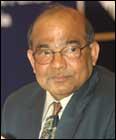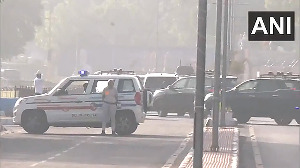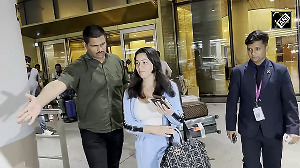Y Venugopal Reddy was a sought-after man at Dubai 2003, the annual meeting of the World Bank and International Monetary Fund.
 As Reserve Bank of India's new Governor, it was his first official visit abroad. And having been an executive director in the IMF immediately before he took charge as India's central bank governor, he was in a position to bring to the table a perspective that many of his counterparts could not.
As Reserve Bank of India's new Governor, it was his first official visit abroad. And having been an executive director in the IMF immediately before he took charge as India's central bank governor, he was in a position to bring to the table a perspective that many of his counterparts could not.
Reddy, however, did not make any oral interjections at the International Monetary and Financial Committee meeting on September 21. The IMFC is the most important body in the Fund comprising 24 finance ministers and is representative of the 184-strong membership.
It advises the IMF board on supervising the management and adaptation of the international monetary and financial system, including the operation of the adjustment process. It also helps the board in reviewing developments in global liquidity and the transfer of resources to developing countries.
Reddy represents India, Sri Lanka, Bhutan and Nepal in the IMFC. His statement at the IMFC meeting did all the talking. At a time when Asian countries, including India, were under sharp attack and criticism by the Fund, including its chief economist Kenneth Rugoff, for accumulating "unreasonable" quantum of foreign exchange reserves, Reddy shared his perspective. If not convincing enough, his statement did not shy away from calling a spade a spade.
His statement and subsequent oral presentation at the Fund-Bank annual meeting kindled a debate there, which back at home in India, was flagged off last year at a seminar organised by the National Council of Applied Economic Research.
"How enough was enough" was the theme then with former finance minister P Chidambaram and Reddy, then RBI deputy governor being two of the main speakers.
| |||||||||||
Rugoff, in an interview to the Business Standard in Dubai, found the 25 per cent spurt in forex reserves in India to $ 88 billion in the current calendar year as difficult to understand. "Till the end of 2002, it was reasonable," he said.
But Reddy explained quite lucidly on September 21 and subsequently again at the joint annual meeting of the IMF and the World Bank on September 23. He told the IMFC that the accumulation of large foreign exchange reserves by Asian countries perhaps reflected their lack of confidence in the international financial architecture.
The improved reserve position in emerging economies would provide "self insurance" and lend necessary flexibility for exchange rate management, Reddy stated. His statement actually quells the argument, which is rife in economist circles about "how much enough is enough".
But Rugoff's main concern post the rapid build-up of forex reserves related to their efficient allocation. This, however, he felt, had two sides to it: both political and economic. While economics speaks about diversification, the political angle was about effecting a perceptible change in the composition of reserves. The RBI and the finance ministry hold such a composition very close to their chest.
Reddy was at his best -- both as a strategist and an economist. At a press conference in Dubai after his address to the joint meeting of the Fund and the Bank, he successfully warded of any questions that slightly digressed from the mandate of the IMFC and the World Bank Development Committee meetings.
In the absence of Finance Minister Jaswant Singh, Reddy as the leader of the Indian delegation, would squarely reject any question raised by the media that did not concern the core issues of the Fund-Bank meetings.
And core issues at the annual meeting related to reconstruction plans of Iraq and Afghanistan and the resource needs for achieving the Millennium Development Goals!
Yes, they were of importance to the media, but more juicy items were issues like the subtle criticism of China for its fixed exchange rate regime, the huge budget and current account deficit of the US and, of course, the allegation that Asian countries buoyant forex reserves were funding these deficits.
Not surprising then that most of the global wires, business newspapers and magazines, and mediapersons from developing countries made a beeline to listen to Reddy and his mantra. It was in a small room in the media block and was jam packed. Much before Reddy walked in, the hall was full.
What was surprising though was Reddy's defensive attitude and his eagerness to avoid answering uncomfortable questions. While his defence to India's rapid build up of forex reserves could be justified in the Asian and more specifically in the Indian context, his argument countering criticism of India's high fiscal deficit was not quite convincing.
Although he admitted that the high fiscal deficit was an impediment to growth, he was not ready to accept that it was a problem. Reddy was also quick to point out his speech at the IMFC and the annual meeting where he said that the primary challenge in macro-economic management today was reining in the deficit.
He, however, distinguished India from other countries, which had structural issues like huge foreign ownership in their public debt, short-term borrowings, and low domestic savings rate.
And before another uncomfortable question, Reddy left, leaving others wanting more of him.






 © 2025
© 2025